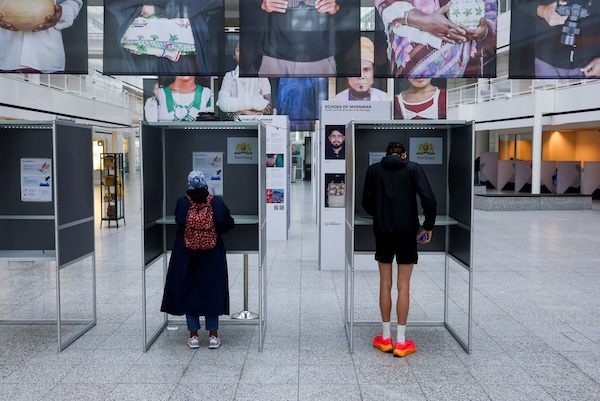 People vote during the Dutch parliamentary election in The Hague, Netherlands, 29 October 2025;
Credit: Reuters/Yves Herman
People vote during the Dutch parliamentary election in The Hague, Netherlands, 29 October 2025;
Credit: Reuters/Yves Herman
THE HAGUE (Reuters) - Dutch voters cast their ballots on Wednesday 29 October 2025 to choose between doubling down on the anti-immigration nationalism of populist Geert Wilders, who sank the last conservative coalition after a fractious two years, or a return to the centre.
With nationalist parties topping polls in the UK, France and Germany, the Dutch national election is a test of whether populism can expand its reach or whether it has peaked in parts of Europe.
Wilders led his party to a stunning first-place finish in the previous election in 2023 and formed an all-conservative coalition - although his partners refused to endorse him as prime minister. He brought the government down in June over its refusal to adopt his hardline anti-refugee measures.
Opinion polls point to very tight race
Opinion polls show the once sizeable lead of Wilders' Freedom Party (PVV) has crumbled, with competitors spanning the mainstream right and left virtually tied with the bleached-blonde admirer of US President Donald Trump.
All four mainstream parties, including the centre-right VVD and Christian Democrats, have said they would not enter into a coalition with Wilders and his PVV party, meaning he would likely be blocked from power unless he wins by an unexpectedly wide margin.
Polling stations opened as early as 06:30 in some locations to make it easier for commuters to vote. The first exit poll, which historically has proven to be accurate, will be released when voting ends at 09:00.
Tough coalition talks lie ahead
Dutch elections have become increasingly unpredictable and building stable coalitions is a fraught task which can take weeks or months.
Opinion polls showed nearly half the electorate was still undecided days ahead of the vote.
Wilders, one of Europe's longest-serving populist leaders, is renowned for his anti-Islam stance and lives under constant protection due to death threats. He proposes saving funds by denying all asylum requests - which would violate EU treaties - sending male Ukrainian refugees back to Ukraine, and halting development aid to finance energy and healthcare benefits.
Meanwhile, the centre-left D66 has grabbed some of the spotlight this month, driven by the energetic performances of its 38-year-old leader Rob Jetten.
With his "Yes, we can"-like campaign messaging, promising a surge in home-building and strong education spending, Jetten stressed the need for a change from the Wilders-dominated politics of the past years.
"What the Netherlands is suffering, is 20 years of the same political talk about asylum (migration) without even one result to show for it," he said at the final TV debate on Tuesday 28 October 2025. "My ambition is that in four years we won't have to talk about asylum all the time, because we have fixed it."
But in Volendam, a fishing town near Amsterdam and a Wilders stronghold, some locals were sticking with him even after the last government with his pick for prime minister failed to deliver the EU's toughest immigration regime, or address an acute housing shortage.
"We need to be able to take care of ourselves, and that's why I'm voting for PVV. Our own people first," Jaap Schilder, 40, fish shop owner and local politician, told Reuters.
Wilders seen doing well, but support ebbing
Wilders' PVV has seen some of its support siphoned away by the Christian Democrats, whose new leader Henri Bontenbal is campaigning on a pledge of government stability and traditional values.
Analysts say that Wilders' ebbing support reflects voter frustration over chaotic infighting in the last coalition. His gushing praise of Trump's leadership and the US president's perceived willingness to test the limits of US democracy also unsettles some voters.
"I wouldn't sleep well at night," Volendam pensioner Greta Blakborn, who is active for the local chapter of the Labour-Green Left party, said of a potential Wilders win.








